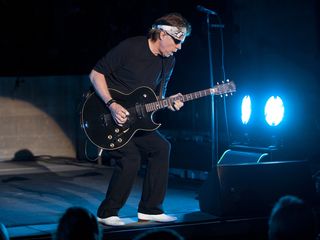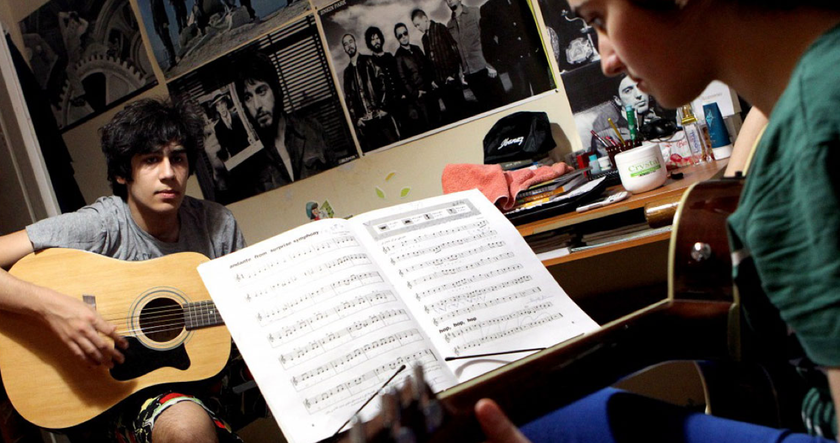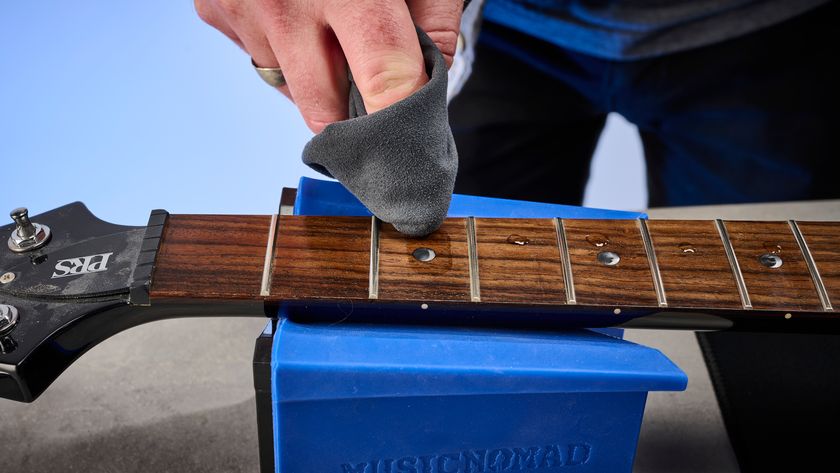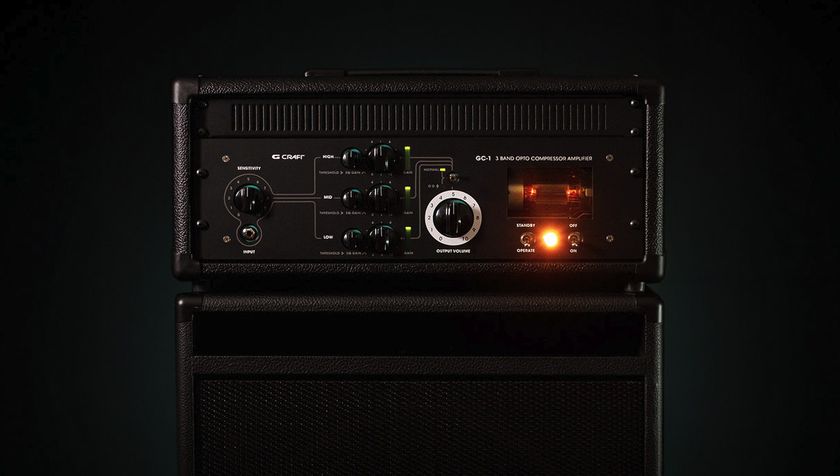
George Thorogood's top 5 tips for guitarists
Although the upcoming co-headline tour of George Thorogood And The Destroyers and Brian Setzer is being billed as the first time in 20 years since the two acts have hit the road together, Thorogood thinks it's actually longer than that. "I know we did it in 1988," he says. "It's been a while, that's for sure."
Asked why it's taken so long for the two guitar greats to pair up for a run of dates, Thorogood laughs and says, "You'd have to ask Brian. Maybe he's been too busy. It’s not like the two of us sit around on the corner and go, ‘OK, what do we do next?’ I don't know why it's taken us all this time, but I'm glad we're doing it.”
Thorogood promises a night full of fiery blues-rock and rockabilly, but he's dubious as to whether he and Setzer will lock horns on stage in dual guitar jams. "I think we're gonna keep the sets very separate," he says. "I don't really know any rockabilly. I do know one song by Eddie Cochran, Nervous Breakdown, and Brian does that in his set. And the truth is, I'm terrible at jamming. I admit it. Jamming with other guys is kind of an art art. My brain doesn’t go that way.”
On the following pages, Thorogood offers his top tips for guitarists. He stands by his second piece of advice ("Don't practice – just play") for warding off creative ruts. “I don’t get in ruts because I just play," he says. "Some night on stage are better than others, but that happens. It’s like doing a Broadway play: Every night, you’re playing to a different audience. Even though you’re performing the same material, some nights it’s full-speed ahead, and other nights it’s a battle. But you can't worry about it. Just play, man.”
The co-headline tour of George Thorogood And The Destroyers and Brian Setzer's Rockabilly Riot kicks off May 27 in Red Bank, NJ, and wraps June 20 in Saratoga, CA. For dates and ticket info, visit georgethorogood.com/tour.

Be patient
“Playing the guitar well takes a long time, so don’t be in a hurry to be great all at once. It’s not like playing the harmonica, where you can sit down and make something happen right off the bat. The guitar takes time – you've gotta investigate what it can do and what you can do with it.
“Also, you have to find the right guitar. I went through many, many guitars before I found the one I was comfortable with. As my hands and my expertise were developing, my guitar needs were changing. I was lucky and found a Gibson ES-125 at a hock shop. I remember it was a Tuesday and I had a gig on a Saturday. I went in, played the guitar, and it was like it was meant to be.
“If you’re going to be serious about playing the guitar, don’t give up. You’ll hit some bumps in the road, and you’ll also find a bunch of guitars that aren’t right for you. Just be patient and work through it.”

Don't practice - just play
“OK, I know I said 'work through it' with the previous tip, but you can't look at playing the guitar like work. Tip number two: Don't practice. Practicing is boring and discouraging. Tell a kid to practice and he won’t do it. Just play. If you’re having fun and enjoying what you’re doing, you’ll get better at it faster and you'll keep at it, as opposed to learning scales and doing hard work.
“Think about it: Willie Mays didn’t practice baseball. He played baseball. He got up and played baseball when he was six years old and kept playing baseball till he was 40. That’s good enough for me.”

Find the right players
“This can be tricky. It all depends on what kind of band you want. Do you want a band like Count Basie, or do you want something like Led Zeppelin? Either one requires the right set of players, so you have to decide what you want and go at it accordingly.
“Do you want a vocal group like Peter, Paul And Mary, or do you want an instrumental group like Jeff Beck? Again, it all depends on what your goals are and what kind of music you want to make. The same people who were in Peter, Paul and Mary could never be in the Jeff Beck Group, and vice versa. Put 'em in the right band, though, and there you go.
“Whatever you want to do, you need to find people you can get along with, at least for a couple of hours. It’s not always crucial – you’d be surprised at how many great groups or comedy acts can't stand each other. Kirk Douglas and Burt Lancaster made seven movies together, and they didn’t like each other that much at all. They stuck together ‘cause they knew it was good business. But in my experience, it’s better if you can get along. It helps.”

Get a good manager
“Get a manager who knows the business. I learned that the hard way. You can try to learn the business yourself, but then you may as well be a manager yourself.
“You can’t discount the importance of a good manager. What would have happened if The Beatles never found Brian Epstein? Nothing. They would’ve disintegrated. No matter how great they were – they knew how to play and they knew how to right – they needed a guy to guide them, market them, expose them and plot the moves. Same with Elvis. Sure, he had the talent and a certain vision, but it took Colonel Tom Parker to sell what Elvis was doing.
“If you think you’ve got something going, get yourself a good manager, somebody who believes in you. And let's be honest: A good manager is going to think he can make a lot of money off of you. Nothing wrong with that.”

Pick the right amp
“It’s like picking the right guitar, the second piece of the puzzle. To a great extent, it all depends on what kind of music you play. Maybe you play an acoustic guitar – you don’t even need an amp. Problem solved
“If you play electric guitar, what kind do you play? Do you play a Les Paul, a Telecaster, a Stratocaster? Do you play a 335 or a 355? That right there will help dictate what kind of amp you need.
“What do you want to do with your music? What kinds of places do you wanna play? Big places, little places? I’d say, find something that’s versatile. Don’t get something that’s too big – nothing bigger than 20 or 30 watts. You can always mic an amp through the house PA. Hell, you can have a transistor radio, but if you mic it right you can play the Grand Canyon. So get something small and portable, something that sounds good. You can put that through the PA and off you go.
“Get something that fits in your car. Chances are, you’d gonna be lugging that thing around by yourself most of the time, unless you’re lucky enough to get in a big band and you have other people lugging your stuff around.”

Joe is a freelance journalist who has, over the past few decades, interviewed hundreds of guitarists for Guitar World, Guitar Player, MusicRadar and Classic Rock. He is also a former editor of Guitar World, contributing writer for Guitar Aficionado and VP of A&R for Island Records. He’s an enthusiastic guitarist, but he’s nowhere near the likes of the people he interviews. Surprisingly, his skills are more suited to the drums. If you need a drummer for your Beatles tribute band, look him up.
Most Popular











